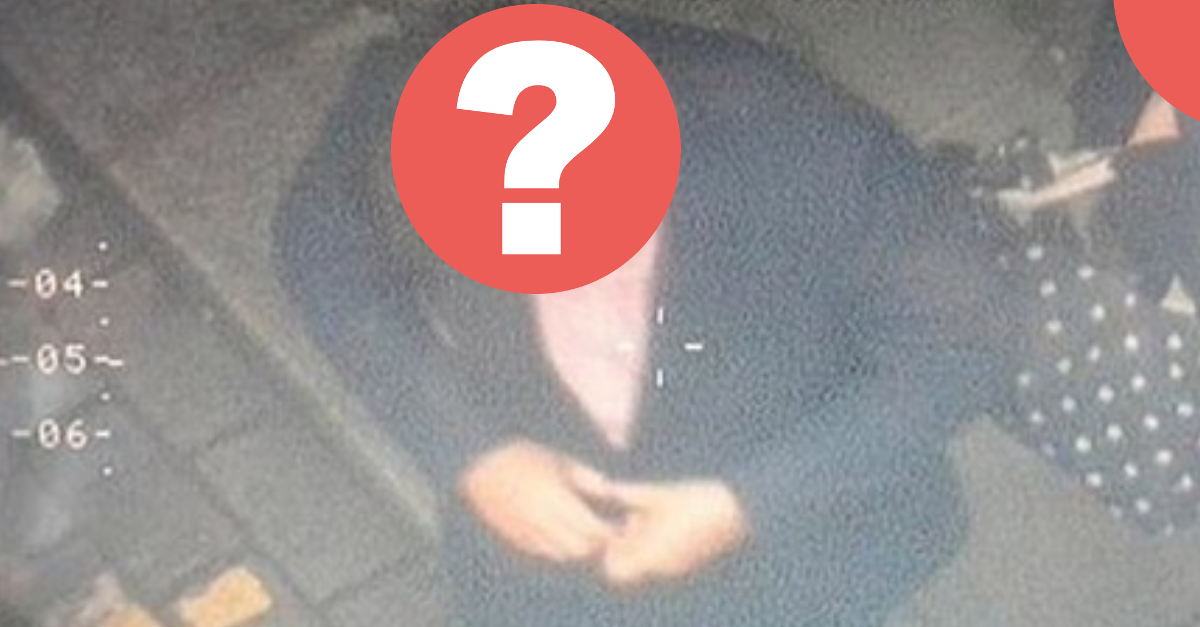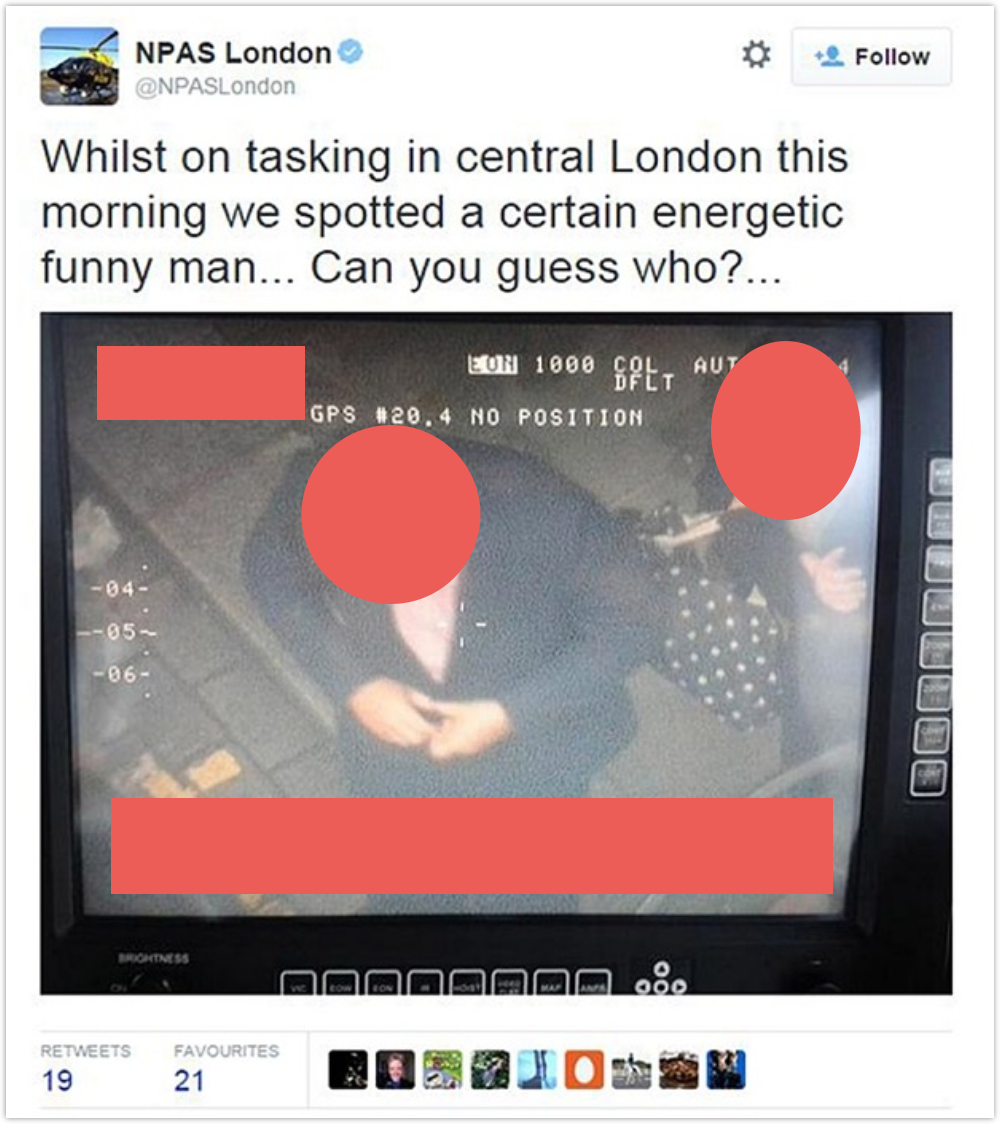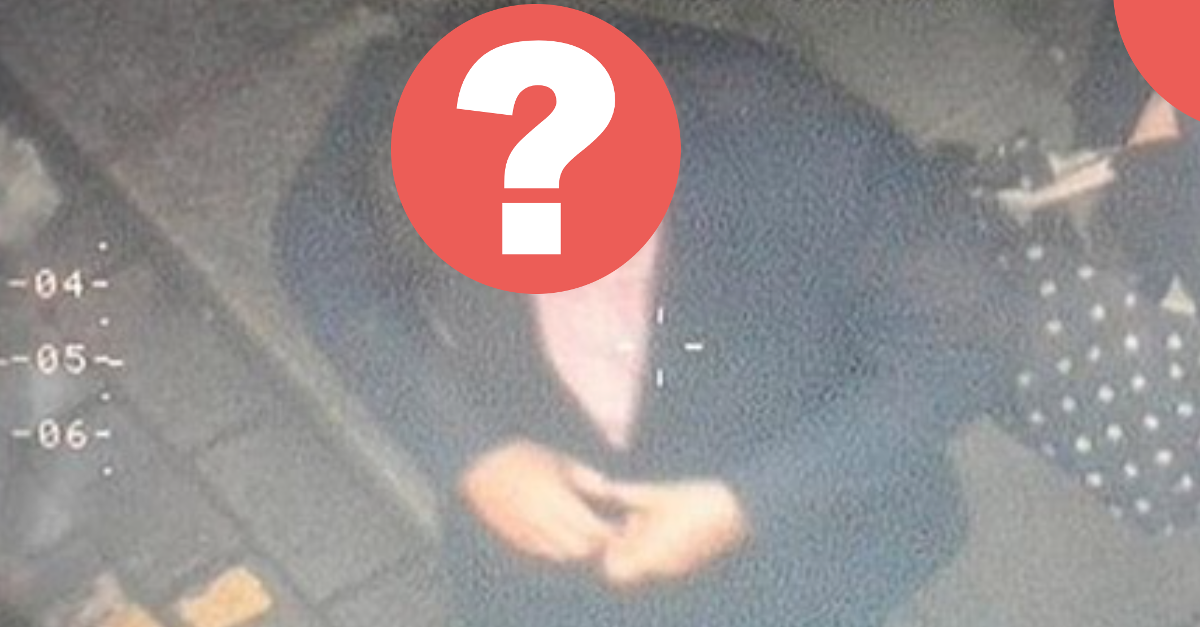
Michael McIntyre is a popular British comedian.
Indeed, Wikipedia says, admittedly somewhat uncertainly, that “in 2012, he was reported to be the highest-grossing comedian in the world.”
(We assume that Wikipedia is talking about his ability to earn money, not the extent to which his jokes turn the stomachs of his audience.)
He’s certainly a well-known and recognisable figure, with his image very frequently in the public eye, both in photographs and on television.
Also, when you’re a performing artist doing live shows, your geolocation becomes as good as a matter of public record, just from the list of venues for which your fans can buy tickets.
So you probably get used to your mugshot appearing in newspapers, on websites, and even in Twitter feeds.
As a result, it probably felt like good, clean fun for the National Police Air Service (NPAS) to grab a frame from the video feed from one of its choppers that apparently showed the aforementioned Mr McIntrye in Leicester Square.
The Tweet invited you to figure out who it was:

While on tasking in central London this morning we spotted a certain energetic funny man... Can you guess who?...
Actually, the photo would almost certainly be useless in evidence, as the subject’s head is down so you can’t see his face at all.
But the Twittersphere seems to have guessed who, and It Was Not Amused.
Not all of it, anyway.
As the Daily Telegraph reported, a Twitterer going by @futureidentity was pretty forthright:
@NPASLondon Did you seek the individual's consent? Or is this an abuse of your considerable surveillance powers?
Admittedly, some weren’t convinced that @futureidentity was on the right track by calling this an abuse of power:
@futureidentity you're absolutely boring. Get a hobby.
The Telegraph also quotes Emma Carr, director of Big Brother Watch, an organisation that was formed in 2009 with the intention of “exposing the true scale of the surveillance state by challenging the policies which threaten our privacy, our freedoms and our civil liberties”:
At best posting this image was a complete waste of time. At worst, NPAS seem to have had complete disregard for the surveillance and data protection laws that are there to protect our privacy. CCTV is there to keep our streets safe, not to intrude on the privacy of celebrities.
Hmmm.
I agree that NPAS ought not to have published this image, but NPAS seems to agree with that viewpoint, too, as it has now been removed.
But Carr’s comments are open to misinterpretation, too.
I’d have said it quite differently, by observing that “surveillance cameras are only justified if there is real evidence that they help to reduce crime, and then the images they capture need to be treated much more sensitively than regular snapshots.”
I’d have avoided mention of celebrity status at all, lest I give the impression that the right to privacy varies with wealth or social cachet.
As an aside, the image that was posted is a neat reminder that computer security isn’t all about hacking, malware and snooping on network traffic.
The published “screengrab” from the video feed looks to have been snapped with a mobile phone camera – and experience suggests you need to be thoughtful about cameras in your workplace.
Anyway, returning to Carr’s strident comments, they say you have to pick your battles…
..so, was this a good one to choose?
What do you think? Have your say in the comments…
(You may remain anonymous and do not have to enter an email address.)

Chris
I can easily see why the non-technical individual who shared the image thought it was harmless, but from a security and privacy perspective, he overstepped his bounds. If it was posted in real time (meaning, if the individual in question is still in the same spot as the camera), it could be argued that he put this man’s life in danger by telling any would-be stalkers where he could be found at that moment.
Anonymous
That’s taking caution to absurd lengths! He had just appeared on live radio, it was already public knowledge where he was. And the tweet appeared two hours later, so he wasn’t there anyway. More importantly if we’re choosing our courses of action based on the potential activities of a vanishingly tiny minority of mentally disturbed people then we’ve got the balance wrong.
Chris
“If we’re choosing our courses of action based on the potential activities of a vanishingly tiny minority of mentally disturbed people then we’ve got the balance wrong.”
That’s like saying “I don’t use locks because there are very few burglars nowadays.”
John Drake
We are over surveilled both legally and illegally…. All secrecy for them and no privacy for ordinary citizens….. Carr’s comments are on the money because questioning authority is never a bad thing. It lets them know that they aren’t the only ones watching….. And maybe you or someone, anyone can tell me when 24/7 total surveillance became an entrenched democratic value…..
Anonymous
Storing any data in relation to your picture (facial recognition), your texting or blogging on a site (facebook), your fist (the way that you type each letter and timing between typing), should be a finable offense for any organisation that does seek permission, lets say… 1000$ per offense. The Only time it should be allowed is when a judge of actual sound mind allows. A court order to ollow up such information As It Relates to a Warrant: you dont start woth say “hey he could be a drug dealer,” find out that is absolutely not the case and then end on “oh he hasnt paid his parking tickets in 3 years.”
Anonymous
Does seek permission I meant to say does Not seek permission
Anonymous
So then, “Anonymous”, you wouldn’t mind letting us all know where you are, right? I mean, what are the odds one of the “vanishingly tiny minority of mentally disturbed people” is stalking you?
Peeler
“I’d have avoided mention of celebrity status at all, lest I give the impression that the right to privacy varies with wealth or social cachet.”
Agreed.
However, does the incessant diet of TV “Police Reality” shows encourage the idea that police footage is freely publishable?
Such footage is intrusive and should be private unless:
– the subject gives informed consent to publication
– it is published as part of court proceedings
– it is published as a “police wanted” type of publication
The latter however often implies “guilt”, so could prejudice a trial and needs to be used with care.